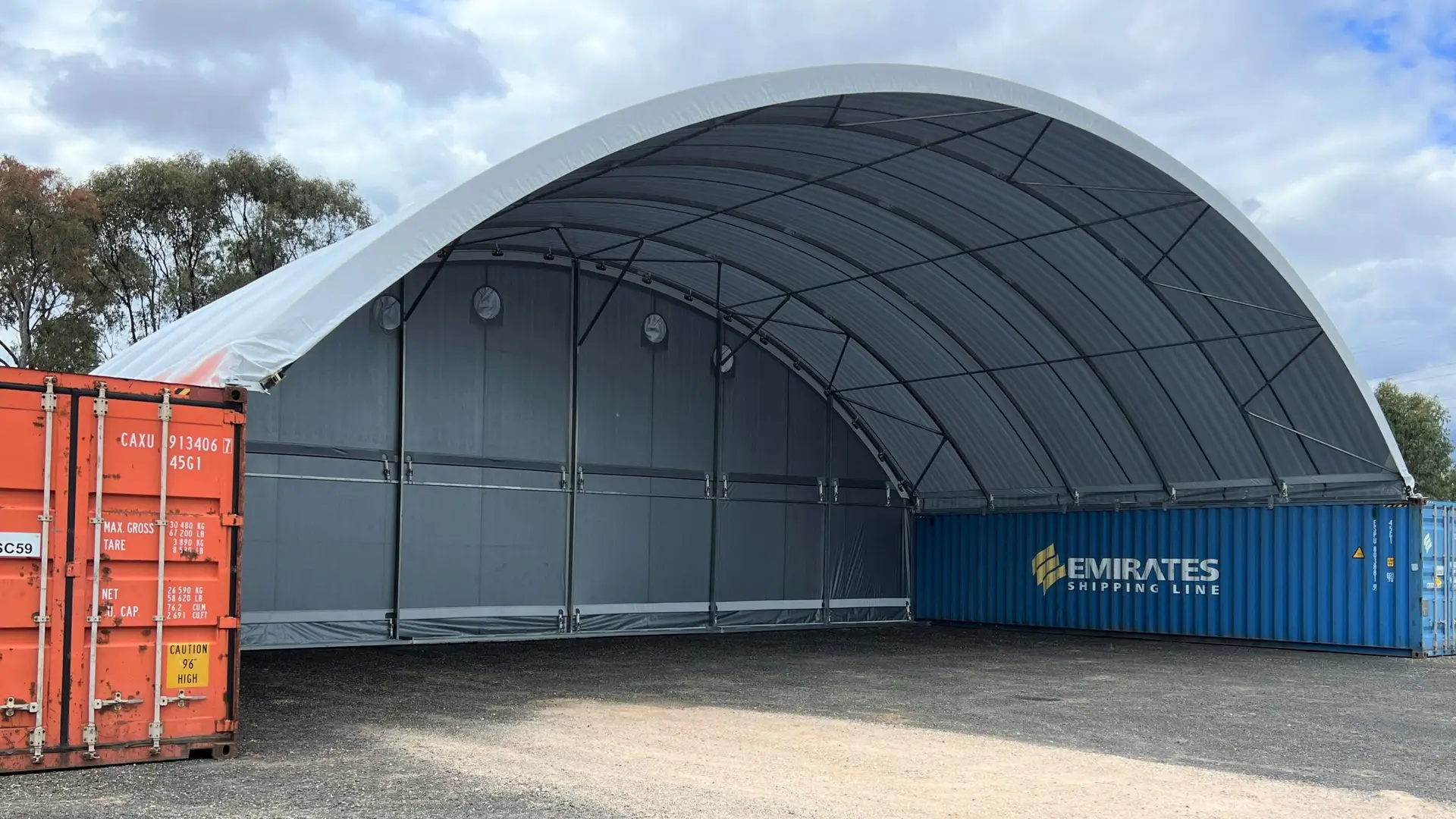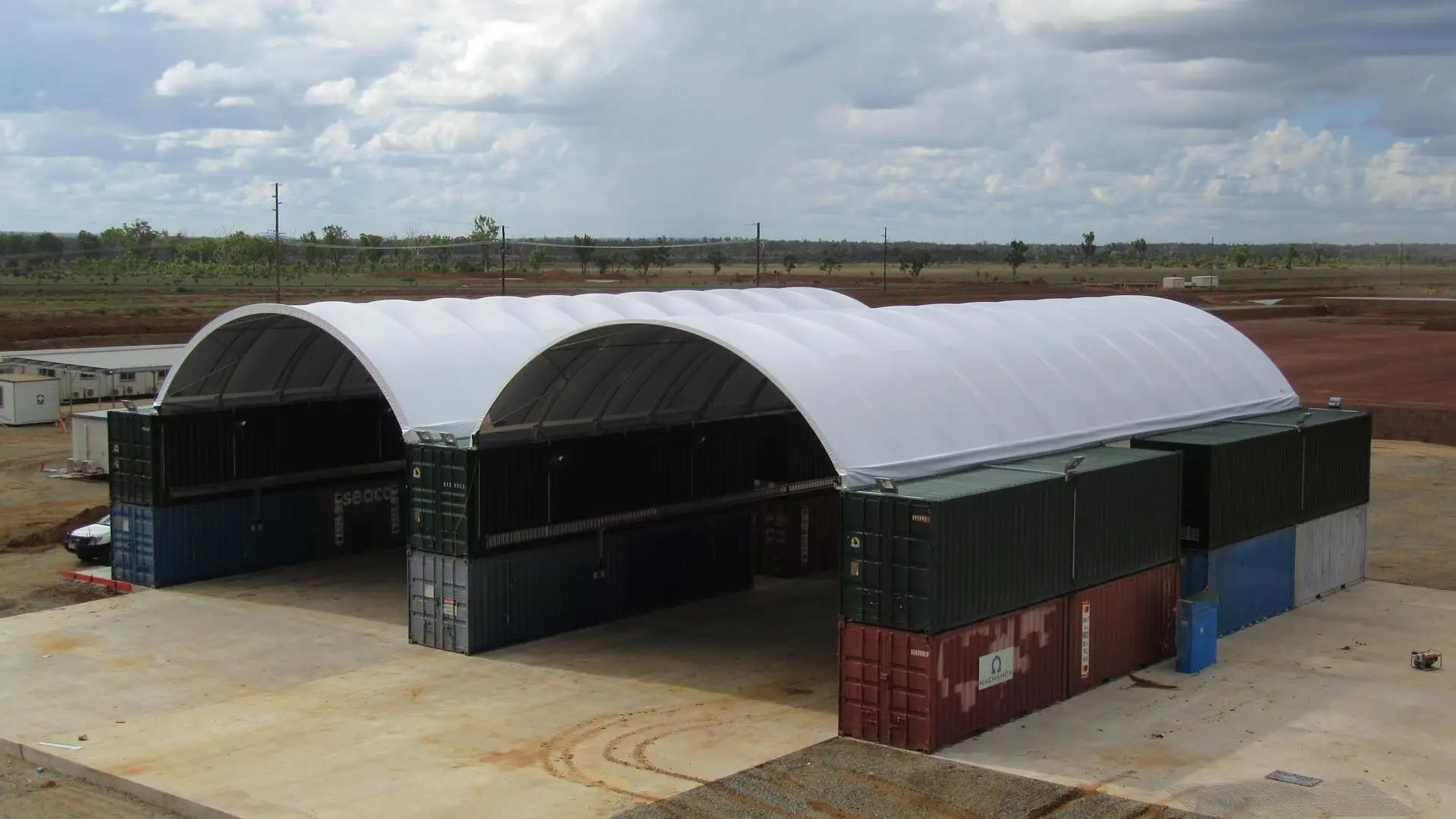When it comes to protecting valuable equipment and materials from Australia’s harsh elements, choosing the right fabric cover is crucial. From scorching summers in Queensland, NSW and the Northern Territory to wet winters in Victoria, ACT, SA and Tas, and wild winds in WA, your shelter needs to stand up to whatever Mother Nature throws at it.
As local Australian industry experts with years of experience in dome shelters and protective covers, we’ve seen firsthand how different materials perform across various Australian conditions.
The two most common materials you’ll encounter in the market are PE (Polyethylene) and PVC (Polyvinyl Chloride) fabrics. We’re often asked about which is best, PE vs. PVC, and their differences. Both have their place in our industry and others, but understanding their distinct characteristics is essential for making an informed decision that aligns with your needs and budget.
No matter your business type—whether you’re in mining, agriculture, or the commercial, civil, or construction sectors—this comprehensive guide will clarify the key differences between these materials, making it easier to make the right decision.

What is PE fabric?
PE fabric is a high-density polyethylene material that’s become increasingly popular in Australia for good reason. This versatile and innovative material has revolutionised the Australian shelter industry and offers excellent protection against our harsh climate while still remaining cost-effective. It is a thermoplastic polymer that results from the polymerisation of ethylene.
Combining advanced manufacturing with robust engineering, PE fabric is the go-to choice for businesses looking for reliable shelter solutions without breaking the bank. It offers a great balance of performance and value.
Key benefits of PE covers
- Value-for-money offering
- Excellent UV and temperature resistance for harsh Australian conditions
- Deals well with harsh chemicals
- Lightweight, flexible, and easy to handle
- Environmentally friendly and recyclable
- Less prone to mould and mildew
- Superior tear resistance for long-lasting wear
- Excellent water resistance
- Easy to repair
- Resistant to sand, salt, dust, and corrosive materials
What is PVC fabric?
PVC fabric is a polyvinyl chloride-based material that’s been used in industrial applications for many decades. Another thermoplastic polymer, PVC is made from woven polyester fibres. These fibres get coated with a layer of PVC on both sides. It’s created through a complex manufacturing process that involves combining a PVC resin with various plasticisers and additives.
Pros of PVC covers:
- High tensile strength; durable
- Waterproof
- Good fire, corrosion, and chemical resistance
- Available in multiple thickness options for different jobs and to help block out light
- Can be welded for repairs
Cons of PVC covers:
- Usually more expensive than the newer, innovative PE
- Heavier weight makes installation more difficult
- Less environmentally friendly; can be toxic and is not recyclable
- Much less flexible than PE
- Can become brittle in extreme cold or from the sun and break down
- It may release harmful chemicals when degrading
- Higher transport and handling costs
- More challenging to dispose of
- Can suffer from plasticiser migration over time
- Generally less UV resistant than PE

The difference between PE and PVC
Several factors come into play when comparing a PE cover vs. a PVC cover. The main ones to consider are:
Cost efficiency
PE fabric offers outstanding value for money, costing significantly less than most PVC alternatives. For businesses watching their bottom line, this makes PE products an attractive option without compromising on quality.
Durability in Australian conditions
PE fabric offers superior UV resistance and better performance in extreme temperatures than PVC fabrics. It’s more flexible in cold weather and less likely to crack or deteriorate, too.
Environmental impact
PE is the clear winner here because it’s 100% recyclable, produces no harmful chemicals, and has a lower carbon footprint. For PE, there is a more sustainable manufacturing process than for PVC, too.
Which is better: PE or PVC?
While PVC has its applications, PE fabric is seen as the superior choice for most Australian businesses, particularly for dome shelters and protective covers. Here’s why:
- PE delivers exceptional value without compromising on quality, making it the smarter financial choice for most applications.
- Our harsh Australian climate demands materials that can withstand extreme conditions. PE’s superior UV resistance and flexibility suit our environment perfectly.
- Practical benefits, such as easier installation due to lighter weight, lower transport costs, better tear resistance, and simple maintenance requirements, make PE the winner.
- While both materials can provide good service life, PE offers better value considering its lower initial cost and excellent durability.
Making the right choice for your business
When selecting between a PE cover vs. PVC cover, keep in mind:
- Your budget constraints
- Local weather conditions
- Installation requirements
- Your business or personal environmental commitments
- Maintenance capabilities
For most Australian businesses, PE fabric represents the ideal performance, durability, and value balance. Its combination of cost-effectiveness, environmental friendliness, and resilience to our unique climate makes it the standout choice for protective covers. It’s the smart choice for Australian businesses looking for reliable protection that won’t let them down.
At Ezy Igloo, we offer a range of helpful storage shelters in multiple sizes with PE covers to suit. No matter your needs, we will have a solution that works for your business or personal requirements.
Want to learn more about our storage shelters and PE fabric solutions? Contact us today to speak with someone from our team of experts and get a quote for one or more Ezy Igloo products.

